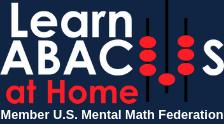
Search for “Strong Math Foundation” on the internet and you will find plenty on articles on importance of a strong math foundation and tips on how to help your child develop that strong math foundation.
As I started digging, I had a hard time finding a definition that clearly explains what it means for a child to have a strong math foundation.
- Does it mean that the child loves math?
- Does it mean that a child always gets good grades in Math?
- Does it mean that the child can calculate quickly in their head?
All reasonable questions. But let’s dig in a bit and understand in layman terms what it means to us for our child to have a strong math foundation. After researching it further, it became clear that it may mean different things to different people.
This article reflects what a Strong Math Foundation at an early age means to me.
Three Pillars of Strong Math Foundation
For me a Strong Math Foundation is like a three-legged stool. The three legs being:
- Understanding – Developing understanding of mathematical concepts, operations and relationships.
- Computational Fluency – Building proficiency to calculate quickly and accurately
- Application – Visualizing the problem and applying math to solve a problem.
To build a stable foundation, a child should be working on all three aspects simultaneously during early age.
Just as music cannot be appreciated by listening to each instrument separately, a strong mathematical foundation cannot be built by developing each of three abilities in isolation.
These three components of a strong math foundation feed upon each other.
For example, as computation becomes more fluent and automatic, the child can focus better on other aspects of a problem and therefore feel confident about tackling new problems, which leads to new understanding.
And as understanding improves, it becomes easy to apply the computational skills to real life events.
And as the child learns to apply math in real life, their mathematical understanding continues to improve.
Children who are unable to think mathematically are denied many of the best opportunities that society offers, and society in turn misses out on benefiting from their potential contributions down the road.
Developing a Strong Math Foundation allows a child to:
- Focus on learning new concepts without worrying about the basic computation process;
- Be confident and not be afraid of Math;
- Build a positive attitude towards numbers and enjoy working with numbers.
Therefore, it is no surprise that early math proficiency is a clear predictor of future success.
So instead on assuming that math performance is tied to innate ability in a child, it behooves parents to push levers they can control by providing children unique opportunities and environment to learn.
Even though all three components are equally important, children obviously develop differently, and it’s difficult to deny age based limitations on their capacity to learn and apply certain math concepts.
While understanding and application of Math concepts improve as child’s reading and comprehension improves, a child’s ability to calculate fluently can develop much earlier in life. Armed with this strong computational fluency, it’s easier for the child to learn and apply new math concepts as they advance through school and beyond.
And there is no better program than Abacus Mind Math to help the child improve their computation fluency very quickly while boosting their confidence and establishing a positive attitude towards math. Adding word problems (aka story problems) to the mix helps the child apply this knowledge and comprehension to real world problems. This improves their grasp of the topic on hand because they have to worry less about the basic computational process and can focus more on understanding the concepts.
At Learn Abacus at Home, we help parents take control and help their child build a Strong Math Foundation. Click here to learn more about achieving early math success through Abacus Mind Math.
